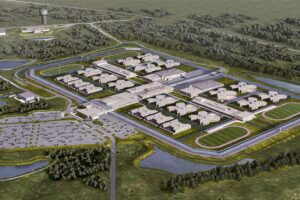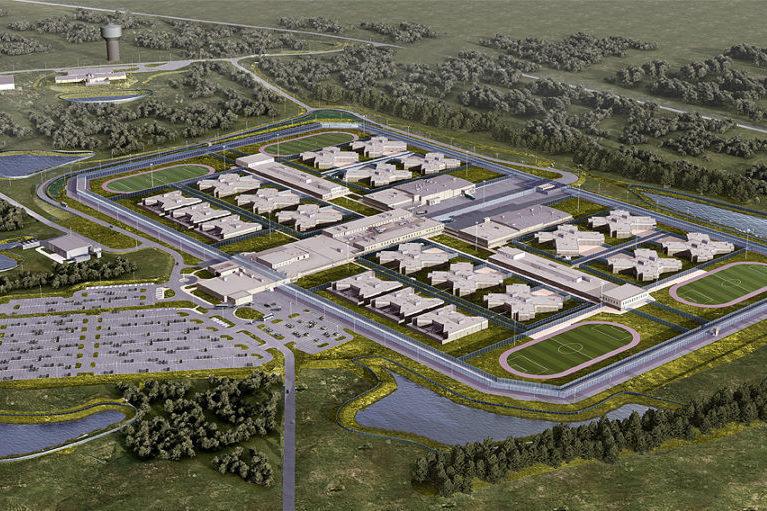SCI Phoenix: PennsylvaniaŌĆÖs Cutting-Edge Correctional Facility Shaping the Future of Incarceration
SCI Phoenix: A Modern Pillar in PennsylvaniaŌĆÖs Correctional Landscape
Opened in 2018, the State Correctional Institution at Phoenix (SCI Phoenix) represents PennsylvaniaŌĆÖs most advanced prison facility, purpose-built to replace several aging institutions and alleviate overcrowding. Operated by the Pennsylvania Department of Corrections, this facility is dedicated to housing male inmates within a secure, technologically sophisticated environment that prioritizes safety, rehabilitation, and operational excellence.
SCI Phoenix is more than just a detention center; it is a cornerstone in PennsylvaniaŌĆÖs evolving criminal justice system, reflecting the stateŌĆÖs commitment to balancing public safety with effective inmate rehabilitation. The institution integrates innovative design and cutting-edge security measures to create a safer environment for both staff and inmates, while also fostering programs aimed at reducing repeat offenses.
Key features of SCI Phoenix include:
- Robust educational offerings such as GED preparation and vocational skill development
- Comprehensive substance abuse interventions targeting addiction as a root cause of criminal behavior
- Specialized mental health services tailored to address diverse inmate needs
- State-of-the-art security infrastructure incorporating advanced surveillance and control systems
Transformative Rehabilitation Initiatives at SCI Phoenix
SCI Phoenix places a strong emphasis on rehabilitation, implementing progressive programs designed to equip inmates with the tools necessary for successful reentry into society. These initiatives focus on addressing behavioral patterns, enhancing vocational skills, and promoting educational attainment, all of which contribute to lowering recidivism rates.
Among the standout programs are:
- Peer-led Therapeutic Communities: These groups foster mutual support and accountability, helping inmates build emotional resilience.
- Hands-on Trade Training: Practical workshops in areas like plumbing, HVAC, and culinary arts provide marketable skills.
- Educational Advancement: Opportunities range from literacy classes to college-level coursework, supporting lifelong learning.
- Comprehensive Reentry Planning: Individualized transition strategies developed in partnership with community organizations ensure continuity of care post-release.
| Program | Participation Rate | Outcome Metric |
|---|---|---|
| Cognitive Behavioral Therapy | 87% | 72% Reduction in Recidivism |
| Vocational Training | 80% | 68% Employment Post-Release |
| Educational Programs | 65% | 82% GED or Higher Certification |
| Reentry Services | 58% | 78% Successful Community Reintegration |
Addressing Operational Challenges at SCI Phoenix
Despite its modern design and comprehensive programs, SCI Phoenix faces ongoing challenges common to large correctional institutions. Overcrowding remains a pressing issue, straining housing capacity and resources. Additionally, maintaining staff morale and retention is critical, as high turnover can disrupt continuity and safety. The complexity of inmate needs, particularly regarding mental health and substance abuse, requires a coordinated, multidisciplinary response.
- Overpopulation: Increased inmate numbers challenge facility capacity and service delivery.
- Workforce Stability: Retaining trained correctional officers is essential for maintaining order and safety.
- Resource Allocation: Expanding educational and vocational programs amid budget constraints.
- Security Management: Preventing contraband and managing inmate conflicts effectively.
To combat these issues, SCI Phoenix has adopted several strategic measures, including enhanced staff development programs, investment in surveillance technology, and strengthened collaborations with community-based organizations. These efforts are supported by data analytics to monitor trends and inform policy adjustments, ensuring a dynamic and responsive management approach.
| Strategy | Implementation | Anticipated Benefit |
|---|---|---|
| Comprehensive Staff Training | Regular workshops on crisis management and de-escalation | Enhanced safety and reduced staff turnover |
| Advanced Security Technology | Expanded camera networks and real-time monitoring | Lower incidence of violence and contraband |
| Expanded Rehabilitation Partnerships | Collaboration with nonprofits for program delivery | Improved inmate outcomes and reduced recidivism |
Strategic Policy Recommendations for SCI PhoenixŌĆÖs Continued Success
Enhancing both security and rehabilitative success at SCI Phoenix requires a holistic, evidence-driven strategy. Prioritizing advanced staff training in trauma-informed care and crisis intervention can significantly reduce incidents and foster a safer environment. Investments in cutting-edge surveillance and communication technologies will further strengthen oversight while respecting inmate dignity.
Expanding access to educational and vocational programs remains critical for reducing recidivism and supporting inmatesŌĆÖ transition back into society. Incorporating restorative justice practices and personalized treatment plans that address behavioral health challenges will promote lasting positive change.
- Staff Development: Training in de-escalation, trauma awareness, and crisis response
- Technological Innovation: Enhanced monitoring systems and data analytics
- Rehabilitation Expansion: Broader educational, vocational, and mental health services
- Restorative Justice: Conflict resolution, mediation, and individualized care plans
| Recommendation | Projected Outcome | Priority Level |
|---|---|---|
| Enhanced Staff Training | Decrease in violent incidents and improved crisis handling | High |
| Technology Upgrades | Stronger security and faster incident response | Medium |
| Expanded Educational Programs | Reduced recidivism and better employment prospects | High |
| Restorative Justice Initiatives | Improved inmate behavior and community relations | Medium |
Conclusion: SCI PhoenixŌĆÖs Role in Shaping PennsylvaniaŌĆÖs Correctional Future
SCI Phoenix exemplifies PennsylvaniaŌĆÖs progressive approach to corrections, blending stringent security with forward-thinking rehabilitation. As the Commonwealth continues to refine its criminal justice policies, this facility will remain a critical hub for innovation and reform. Staying abreast of developments at SCI Phoenix offers valuable insight into the evolving dynamics of incarceration and public safety in Pennsylvania.







